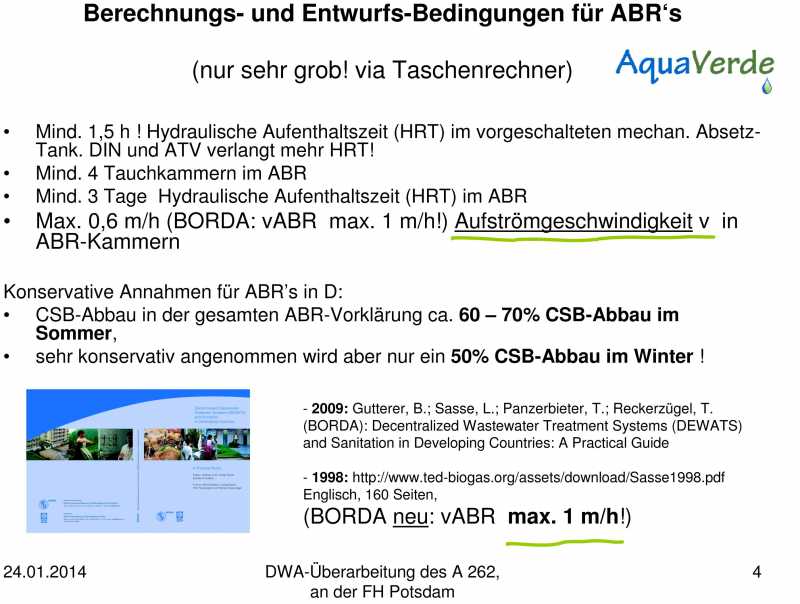- Sanitation systems
- Treatment of wastewater, sludges, organic waste, excreta
- Anaerobic treatment systems (biogas sanitation)
- Anaerobic baffled reactor (ABR)
- ABR-CW quick sizing tool
ABR-CW quick sizing tool
10.8k views
- dmrobbins10
-

- Improving life and livelihood through decentralized wastewater management
Less- Posts: 56
- Karma: 10
- Likes received: 33
Here are two toolkits that you may find useful:
The first is a simple Excel tool that provides some rough design ideas. In this tool the strength of the wastewater is adjusted by adjusting the storage factor (see instructions at the bottom of page 1 of the tool). It uses 1.35 for a storage factor for residential strength wastewater, 1.8 - 2.4 for medium strength wastewater typical of a public market or hospital, and 2.5 - 3.5 for high strength.
The second is a constructed wetlands toolkit developed some years ago by the Bohal Environmental Management Office (BEMO) in the Philippines. This one is modeled using Reeds method. Pay special attention to the hydraulic conductivity of the media, as this has a big impact upon the overall sizing.
To my knowledge both of these have not been vetted by "professional" engineers and should be used with caution, and for discussion only, and not as a substitute for real engineering. It would be good to know if you find these useful or at least interesting.
Best,
Dave Robbins
This email address is being protected from spambots. You need JavaScript enabled to view it.
The first is a simple Excel tool that provides some rough design ideas. In this tool the strength of the wastewater is adjusted by adjusting the storage factor (see instructions at the bottom of page 1 of the tool). It uses 1.35 for a storage factor for residential strength wastewater, 1.8 - 2.4 for medium strength wastewater typical of a public market or hospital, and 2.5 - 3.5 for high strength.
The second is a constructed wetlands toolkit developed some years ago by the Bohal Environmental Management Office (BEMO) in the Philippines. This one is modeled using Reeds method. Pay special attention to the hydraulic conductivity of the media, as this has a big impact upon the overall sizing.
To my knowledge both of these have not been vetted by "professional" engineers and should be used with caution, and for discussion only, and not as a substitute for real engineering. It would be good to know if you find these useful or at least interesting.
Best,
Dave Robbins
This email address is being protected from spambots. You need JavaScript enabled to view it.
David M. Robbins
This email address is being protected from spambots. You need JavaScript enabled to view it.
This email address is being protected from spambots. You need JavaScript enabled to view it.
This message has attachments files.
Please log in or register to see it.
The following user(s) like this post: osbert, ogeda
Please Log in to join the conversation.
You need to login to reply
Dear Marijn,
Keep your self on very conservative side, e.g. use average temperature of colder season of possible location to design an "improved pre-treatment" (ABR) in front of CW.
Keep Up-flow velocity in ALL ABR-cambers less them 1 m/h!!! Especial if you do your first ABR-trail, do not reduce 40% CW-m2 as recommended in a GIZ/GTZ-paper. You may start very conservative with max. 10% reduction... without "wishful thinking" .
.
I have all different versions of BORDA's Excel used, I found them very cumbersome. They need further developments in my opinion. By the way, Prof. Otterpohl developed this "tropical"-Excel together with Mr. Sasse many years ago! E.g. in Moldavia one ABR for 30 m3/d been designed, I regret 1/2 the size necessary with BORDA's "tropical"-Excel without real practical ABR-experiences! I by my self ended up using just "common sense" & only pocket calculator for our cold climate conditions in Germany, just to keep on the save side...
for our cold climate conditions in Germany, just to keep on the save side...
see picture in German language:
Good luck
Detlef
Keep your self on very conservative side, e.g. use average temperature of colder season of possible location to design an "improved pre-treatment" (ABR) in front of CW.
Keep Up-flow velocity in ALL ABR-cambers less them 1 m/h!!! Especial if you do your first ABR-trail, do not reduce 40% CW-m2 as recommended in a GIZ/GTZ-paper. You may start very conservative with max. 10% reduction... without "wishful thinking"
I have all different versions of BORDA's Excel used, I found them very cumbersome. They need further developments in my opinion. By the way, Prof. Otterpohl developed this "tropical"-Excel together with Mr. Sasse many years ago! E.g. in Moldavia one ABR for 30 m3/d been designed, I regret 1/2 the size necessary with BORDA's "tropical"-Excel without real practical ABR-experiences! I by my self ended up using just "common sense" & only pocket calculator
see picture in German language:
Good luck
Detlef
www.aqua-verde.de, AquaVerde Ltd. Zanzibar
"simple" Sanitation-Solutions by gravity
Low-Tech Solutions with High-Tech Effects
"Inspired by Circular Economy and Cooperation"
www.flickr.com/photos/aqua-verde/
"simple" Sanitation-Solutions by gravity
Low-Tech Solutions with High-Tech Effects
"Inspired by Circular Economy and Cooperation"
www.flickr.com/photos/aqua-verde/
Attachments:
-
 frsusana29.4.jpg
(Filesize: 63KB)
frsusana29.4.jpg
(Filesize: 63KB)
The following user(s) like this post: JKMakowka
Please Log in to join the conversation.
You need to login to reply
Dear Jan,
Thanks, I was aware of the DEWATS booklet by Sasse, et al. I find a bit unfortunate that they presented the formulas used in the spreadsheets as EXCEL code, rather than as the formulas they used to base the Excel code on.
Probably, a lot of the formulas that were used for this booklet are still valid. Though for colder climates some parameters (such as up flow speed)may have to be adjusted.
Regards
Marijn
Thanks, I was aware of the DEWATS booklet by Sasse, et al. I find a bit unfortunate that they presented the formulas used in the spreadsheets as EXCEL code, rather than as the formulas they used to base the Excel code on.
Probably, a lot of the formulas that were used for this booklet are still valid. Though for colder climates some parameters (such as up flow speed)may have to be adjusted.
Regards
Marijn
Marijn Zandee
E: This email address is being protected from spambots. You need JavaScript enabled to view it.
E: This email address is being protected from spambots. You need JavaScript enabled to view it.
Please Log in to join the conversation.
You need to login to reply- jankn
-
 Less
Less- Posts: 35
- Karma: 8
- Likes received: 21
Hi Elisabeth
Exactly, the formulas are there in the book, but the Excel files are not available for general use (as far as I know).
I have seen those Excel files being used by BORDA colleagues; but you are right, a word of caution might be advised. Given that the original book has been published nearly 20 years ago now, I am certain that these calculations have been updated based on more recent findings and regional experiences with different design parameters. However, they can still serve as a starting point (!) for dimensioning DEWATS modules (namely Settler, a modified septic tank or ST; Imhoff tanks, biogas settlers or BGS, ABR, AF, PGF, and polishing pond or PP - to add some more abbreviations to the list), but final design should be reviewed by experienced regional experts.
Best
/Jan
Exactly, the formulas are there in the book, but the Excel files are not available for general use (as far as I know).
I have seen those Excel files being used by BORDA colleagues; but you are right, a word of caution might be advised. Given that the original book has been published nearly 20 years ago now, I am certain that these calculations have been updated based on more recent findings and regional experiences with different design parameters. However, they can still serve as a starting point (!) for dimensioning DEWATS modules (namely Settler, a modified septic tank or ST; Imhoff tanks, biogas settlers or BGS, ABR, AF, PGF, and polishing pond or PP - to add some more abbreviations to the list), but final design should be reviewed by experienced regional experts.
Best
/Jan
Jan Knappe
Doctoral Researcher on environmental performance assessment and modeling of on-site wastewater treatment systems
Trinity College Dublin & University of Limerick
Email: jan.knappe(at)tcd.ie, Twitter: @JanKnappe
Doctoral Researcher on environmental performance assessment and modeling of on-site wastewater treatment systems
Trinity College Dublin & University of Limerick
Email: jan.knappe(at)tcd.ie, Twitter: @JanKnappe
The following user(s) like this post: Elisabeth
Please Log in to join the conversation.
You need to login to reply- Elisabeth
-
- User is blocked
- Freelance consultant since 2012
Less- Posts: 3372
- Karma: 54
- Likes received: 932
Re: ABR-CW quick sizing tool
Hi Marijn,
Just to answer your question from 19 April quickly: yes "hab." is the abbreviation for habitant or user. Let me add that to our list of abbreviations: en.wikipedia.org/wiki/Wikipedia:WikiProj...iations_and_acronyms

Hi Jan,
Are those Excel files available for general use? I guess not, as perhaps in the hands of non-experts they do more harm than they do good? (I think this was one of the reasons for BORDA in the past to not make such Excel files available). Just wondering.
Regards,
Elisabeth
Just to answer your question from 19 April quickly: yes "hab." is the abbreviation for habitant or user. Let me add that to our list of abbreviations: en.wikipedia.org/wiki/Wikipedia:WikiProj...iations_and_acronyms
Hi Jan,
Are those Excel files available for general use? I guess not, as perhaps in the hands of non-experts they do more harm than they do good? (I think this was one of the reasons for BORDA in the past to not make such Excel files available). Just wondering.
Regards,
Elisabeth
Dr. Elisabeth von Muench
Freelance consultant on environmental and climate projects
Freelance consultant on environmental and climate projects
Please Log in to join the conversation.
You need to login to reply- jankn
-
 Less
Less- Posts: 35
- Karma: 8
- Likes received: 21
The DEWATS in Developing Countries book by Sasse gives Excel based calculations in chapter 13 for ABRs and horizontal flow planted gravel filters:
www.sswm.info/sites/default/files/refere...%20Developing%20Coun
www.sswm.info/sites/default/files/refere...%20Developing%20Coun
Jan Knappe
Doctoral Researcher on environmental performance assessment and modeling of on-site wastewater treatment systems
Trinity College Dublin & University of Limerick
Email: jan.knappe(at)tcd.ie, Twitter: @JanKnappe
Doctoral Researcher on environmental performance assessment and modeling of on-site wastewater treatment systems
Trinity College Dublin & University of Limerick
Email: jan.knappe(at)tcd.ie, Twitter: @JanKnappe
Please Log in to join the conversation.
You need to login to reply
Kris and Christoph,
Thanks, this will give us some general idea to start a discussion.
Christoph,
The figure of 3m2/hab does this mean per inhabitant/user?
Regards
Marijn
Thanks, this will give us some general idea to start a discussion.
Christoph,
The figure of 3m2/hab does this mean per inhabitant/user?
Regards
Marijn
Marijn Zandee
E: This email address is being protected from spambots. You need JavaScript enabled to view it.
E: This email address is being protected from spambots. You need JavaScript enabled to view it.
Please Log in to join the conversation.
You need to login to reply
Very quick and dirty 
 ... just to have an idea about volume and space.
... just to have an idea about volume and space.
For warm climates
CP
- 12 h detention time for the ABR
- 1,8 m²/hab. for a vertical flow sand filter wetland, 3m²/hab. horizontal flow.
For warm climates
CP
The following user(s) like this post: Elisabeth, Marijn Zandee
Please Log in to join the conversation.
You need to login to reply
Will this help for the ABR?
www.sswm.info/sites/default/files/refere...nd%20Tecnologies.pdf
And maybe this for wetlands:
www.sswm.info/sites/default/files/refere...ucted%20Wetlands.pdf
(www.sswm.info is a good resource for finding such documents)
www.sswm.info/sites/default/files/refere...nd%20Tecnologies.pdf
And maybe this for wetlands:
www.sswm.info/sites/default/files/refere...ucted%20Wetlands.pdf
(www.sswm.info is a good resource for finding such documents)
The following user(s) like this post: Marijn Zandee
Please Log in to join the conversation.
You need to login to reply
Dear colleagues,
Does anyone have a quick and dirty sizing tool (or reference to some simple formulas) for an ABR and a Constructed wetland to treat approximately 8 m3 of waste water per day? The BOD is probably around 250 mg/L.
At this stage I need to give people some idea of the size of units we would need for this option. If it becomes a serious project, we will do actual BOD/COD analyses and hire a waste water engineer for the design of the unit.
Thanks
Marijn Zandee
Does anyone have a quick and dirty sizing tool (or reference to some simple formulas) for an ABR and a Constructed wetland to treat approximately 8 m3 of waste water per day? The BOD is probably around 250 mg/L.
At this stage I need to give people some idea of the size of units we would need for this option. If it becomes a serious project, we will do actual BOD/COD analyses and hire a waste water engineer for the design of the unit.
Thanks
Marijn Zandee
Marijn Zandee
E: This email address is being protected from spambots. You need JavaScript enabled to view it.
E: This email address is being protected from spambots. You need JavaScript enabled to view it.
Please Log in to join the conversation.
You need to login to reply
Share this thread:
- Sanitation systems
- Treatment of wastewater, sludges, organic waste, excreta
- Anaerobic treatment systems (biogas sanitation)
- Anaerobic baffled reactor (ABR)
- ABR-CW quick sizing tool
Recently active users. Who else has been active?
Time to create page: 0.214 seconds








